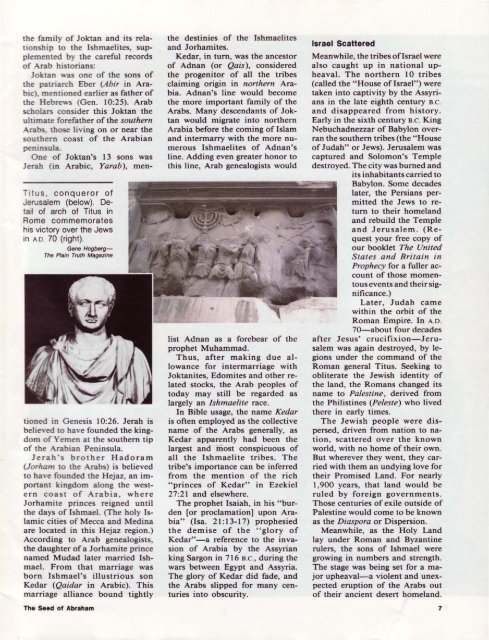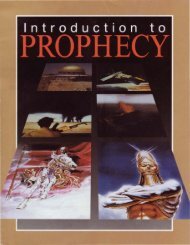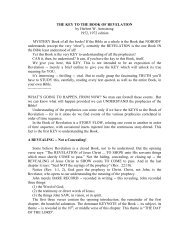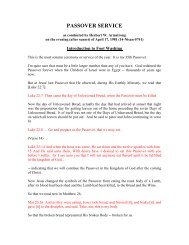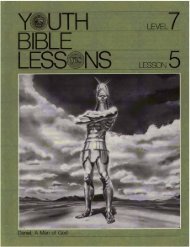Middle East in Prophecy - Church of God - NEO
Middle East in Prophecy - Church of God - NEO
Middle East in Prophecy - Church of God - NEO
Create successful ePaper yourself
Turn your PDF publications into a flip-book with our unique Google optimized e-Paper software.
the family <strong>of</strong> Joktan and its relationship<br />
to the Ishmaelites, supplemented<br />
by the careful records<br />
<strong>of</strong> Arab historians:<br />
J oktan was one <strong>of</strong> the sons <strong>of</strong><br />
the patriarch Eber (A bir <strong>in</strong> Arabic<br />
. mentioned earlier as father <strong>of</strong><br />
the Hebrews (Gen. 10:25). Arab<br />
scholars consider this J oktan the<br />
ultimate forefather <strong>of</strong> the southern<br />
Arabs. those liv<strong>in</strong>g on or near the<br />
southern coast <strong>of</strong> the Arabian<br />
pen<strong>in</strong>sula.<br />
One <strong>of</strong> Joktan's 13 sons was<br />
Jerah (<strong>in</strong> Arabic, Yarab), men-<br />
Titus, conqueror <strong>of</strong><br />
Jerusalem (below). Detail<br />
<strong>of</strong> arch <strong>of</strong> Titus <strong>in</strong><br />
Rome commemorates<br />
his victory over the Jews<br />
<strong>in</strong> AD. 70 (right).<br />
Gene Hogberg<br />
The Pla<strong>in</strong> Truth Magaz<strong>in</strong>e<br />
tioned <strong>in</strong> Genesis 10:26. Jerah is<br />
belie ed to have founded the k<strong>in</strong>gdom<br />
<strong>of</strong> Yemen at the southern tip<br />
<strong>of</strong> the Arabian Pen<strong>in</strong>sula.<br />
Jerah's brother Hadoram<br />
(Jorham to the Arabs) is believed<br />
to ha e founded the Hejaz, an important<br />
k<strong>in</strong>gdom along the weste<br />
rn coast <strong>of</strong> Arabia, wher e<br />
Jorhamite pr<strong>in</strong>ces reigned until<br />
the days <strong>of</strong> Ishmael. (The holy Islamic<br />
cities <strong>of</strong> Mecca and M ed<strong>in</strong>a<br />
are located <strong>in</strong> this Hej az region.)<br />
Accord<strong>in</strong>g to Arab genealogists,<br />
the daughter <strong>of</strong> a Jorhamite pr<strong>in</strong>ce<br />
named Mudad later married Ishmael.<br />
From that marriage was<br />
born Ishmael's illustrious son<br />
Kedar (Qaidar <strong>in</strong> Arabic). This<br />
marriage alliance bound tightly<br />
The Seed <strong>of</strong> Abraham<br />
the dest<strong>in</strong>ies <strong>of</strong> the Ishmaelites<br />
and Jorhamites.<br />
Kedar, <strong>in</strong> turn, was the ancestor<br />
<strong>of</strong> Adnan (or Qais), considered<br />
the progenitor <strong>of</strong> all the tribes<br />
claim<strong>in</strong>g orig<strong>in</strong> <strong>in</strong> northern Arabia.<br />
Adnan's l<strong>in</strong>e would become<br />
the more important family <strong>of</strong> the<br />
Arabs. Many descendants <strong>of</strong> Joktan<br />
would migrate <strong>in</strong>to northern<br />
Arabia before the com<strong>in</strong>g <strong>of</strong> Islam<br />
and <strong>in</strong>termarry with the more numerous<br />
Ishmaelites <strong>of</strong> Adnan's<br />
l<strong>in</strong>e. Add<strong>in</strong>g even greater honor to<br />
this l<strong>in</strong>e, Arab genealogists would<br />
list Adnan as a forebear <strong>of</strong> the<br />
prophet Muhammad.<br />
Thus, after mak<strong>in</strong>g due allowance<br />
for <strong>in</strong>termarriage with<br />
Joktanites, Edomites and other related<br />
stocks, the Arab peoples <strong>of</strong><br />
today may still be regarded as<br />
largely an Ishmaelite race.<br />
In Bible usage, the name Kedar<br />
is <strong>of</strong>ten employed as the collective<br />
name <strong>of</strong> the Arabs generally, as<br />
Kedar apparently had been the<br />
largest and most conspicuous <strong>of</strong><br />
all the Ishmaelite tribes. The<br />
tribe's importance can be <strong>in</strong>ferred<br />
from the mention <strong>of</strong> the rich<br />
" pr<strong>in</strong>ces <strong>of</strong> Kedar" <strong>in</strong> Ezekiel<br />
27:21 and elsewhere.<br />
The prophet Isaiah, <strong>in</strong> his "burden<br />
[or proclamation] upon Arabia"<br />
(Isa. 21:13-17) prophesied<br />
the demise <strong>of</strong> the " glory <strong>of</strong><br />
Kedar" -a reference to the <strong>in</strong>vasion<br />
<strong>of</strong> Arabia by the Assyrian<br />
k<strong>in</strong>g Sargon <strong>in</strong> 716 B.c., dur<strong>in</strong>g the<br />
wars between Egypt and Assyria.<br />
The glory <strong>of</strong> Kedar did fade, and<br />
the Arabs slipped for many centuries<br />
<strong>in</strong>to obscurity.<br />
Israel Scattered<br />
Meanwhile, the tribes <strong>of</strong>Israel were<br />
also caught up <strong>in</strong> national upheaval.<br />
The northern 10 tribes<br />
(called the "House <strong>of</strong>Israel") were<br />
taken <strong>in</strong>to captivity by the Assyrians<br />
<strong>in</strong> the late eighth century B.c.<br />
and disappeared from history.<br />
Early <strong>in</strong> the sixth century B.c. K<strong>in</strong>g<br />
Nebuchadnezzar <strong>of</strong> Babylon overran<br />
the southern tribes (the " House<br />
<strong>of</strong> Judah" or Jews). Jerusalem was<br />
captured and Solomon's Temple<br />
destroyed. The city was burned and<br />
its <strong>in</strong>habitants carried to<br />
Babylon. Some decades<br />
later, the Persians permitted<br />
the Jews to return<br />
to their homeland<br />
and rebuild the Temple<br />
and Jerusalem. (Request<br />
your free copy <strong>of</strong><br />
our booklet The United<br />
S tates and Brita<strong>in</strong> <strong>in</strong><br />
<strong>Prophecy</strong> for a fuller account<br />
<strong>of</strong> those momentous<br />
events and their significance.)<br />
Later, Judah came<br />
with<strong>in</strong> the orbit <strong>of</strong> the<br />
Roman Empire. In A.D.<br />
70-about four decades<br />
after Jesus' crucifixion-Jerusalem<br />
was aga<strong>in</strong> destroyed, by legions<br />
under the command <strong>of</strong> the<br />
Roman general Titus. Seek<strong>in</strong>g to<br />
obliterate the Jewish identity <strong>of</strong><br />
the land, the Romans changed its<br />
name to Palest<strong>in</strong>e, derived from<br />
the Philist<strong>in</strong>es (Peleste) who lived<br />
there <strong>in</strong> early times.<br />
The Jewish people were dispersed,<br />
driven from nation to nation,<br />
scattered over the known<br />
world, with no home <strong>of</strong> their own.<br />
But wherever they went, they carried<br />
with them an undy<strong>in</strong>g love for<br />
their Promised Land. For nearly<br />
1,900 years, that land would be<br />
ruled b y foreign governments.<br />
Those centuries <strong>of</strong> exile outside <strong>of</strong><br />
Palest<strong>in</strong>e would come to be known<br />
as the Diaspora or Dispersion.<br />
Meanwhile, as the Holy Land<br />
lay under Roman and Byzant<strong>in</strong>e<br />
rulers, the sons <strong>of</strong> Ishmael were<br />
grow<strong>in</strong>g <strong>in</strong> numbers and strength.<br />
The stage was be<strong>in</strong>g set for a major<br />
upheaval-a violent and unexpected<br />
eruption <strong>of</strong> the Arabs out<br />
<strong>of</strong> their ancient desert homeland.<br />
7


